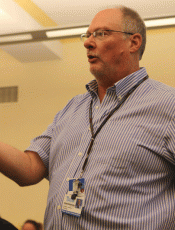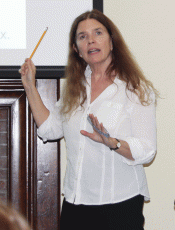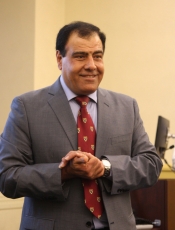Dr. Jeffery Griffiths
Dr. Jeffrey Griffiths from the Tufts University School of Medicine speaks with the EPIIC 2012-13 class. Dr. Griffiths gave a presentation titled, " Agriculture, Nutrition, and Health: Improving the Lives of the Global Poor."

At EPIIC's core is the year-long, multidisciplinary course on a global political theme. Undergraduate and graduate students of diverse nationalities, viewpoints, experiences, and interests, participate in this rigorous colloquium that stresses critical, analytical and normative thinking. Students are encouraged to confront the ambiguity and complexity of EPIIC's annual global theme through a multi-disciplinary examination of the issues and controversies that the topic reflects. They are taught the subject under investigation not only by a broad range of distinguished academics and practitioners, but also as active participants in defining the issues through classroom presentations and discussions, extensive readings, and independent research. There is an emphasis both on individual progress and on the collaborative effort -- in essence, an intellectual team. Students produce tangible outcomes to their studies through their individual research papers or projects, the international symposium, and the Inquiry simulation.

Dr. Jeffrey Griffiths from the Tufts University School of Medicine speaks with the EPIIC 2012-13 class. Dr. Griffiths gave a presentation titled, " Agriculture, Nutrition, and Health: Improving the Lives of the Global Poor."

Anne Goldfeld is an Associate Professor of Medicine at Harvard Medical School, a Senior Investigator at the Immune Disease Institute, Associate Professor of Immunology and Infectious Disease at the Harvard School of Public Health, and a member of the Infectious Disease Division at Brigham & Women's Hospital in Boston. Work in her laboratory at the Immune Disease Institute focuses on basic gene regulation and on new understanding of how the immune system responds to tuberculosis and AIDS. Her lab has discovered basic mechanisms of cell type- and inducer-specific gene regulation using the TNF gene and HIV as model systems and genes and described new T cell responses associated with TB susceptibility and latency. As the co-founder of the Cambodian Health Committee and the Global Health Committee, she has helped pioneer new models of TB and AIDS care and access to treatment while integrating basic research approaches to improve care and to discover new approaches and therapies.

Known simply as “the Gaza doctor,” Dr. Abuelaish captured hearts and headlines around the world in the aftermath of horrific tragedy on Janurary 16, 2009 Israeli shells hit his home in the Gaza Strip, killing three of his daughters and a niece.
It was his response to the loss of his children that made news and won him humanitarian awards around the world. Instead of seeking revenge or sinking into hatred, Dr. Abuelaish is calling for the people of the Middle East to start talking to each other. His deepest hope is that his daughters will be the last sacrifice on the road to peace between Palestinians and Israelis.
A Palestinian doctor who was born and raised in the Jabalia refugee camp in the Gaza Strip, Dr. Abuelaish is an infertility specialist who lived in Gaza but applied his specialty in Israeli hospitals. From the strip of land he calls home (a place where 1.5 million refugees are crammed into 360 square kilometres of land), the Gaza doctor has been crossing the lines that divide the region for most of his life, as a physician who treats patients on both sides of the border and as a humanitarian who sees the need for improved public health and education for women as the way forward in the Middle East. He is the founder of the Daughters for Life Foundation, which provides scholarships for women in the Middle East.